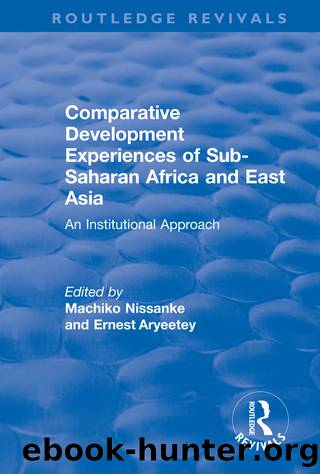Comparative Development Experiences of Sub-Saharan Africa and East Asia by Machiko Nissanke & Ernest Aryeetey

Author:Machiko Nissanke & Ernest Aryeetey
Language: eng
Format: epub
Publisher: Routledge
PublicâPrivate Interactions and Relationships
State intervention in the African context was associated with varying relationships with the private sector. A study of six African countries (Cote d'lvoire, Nigeria, Kenya, Tanzania, Zimbabwe and Mauritius) addressed the relationship between government and the private sector and found varying relations between them (Wangwe, 1995).
The system of controls in the then Rhodesia was made to operate effectively and the highly protected system that they constituted did not lead to the gross inefficiency that has characterized other import substitution regimes. The need to adapt and innovate led to the development of a wide range of technical skills, particularly in various branches of engineering. The strong orientation to market requirements led to a proliferation of products, often produced within large, vertically integrated conglomerates (NcUela and Robinson, 1995)'.
In the case of Mauritius the government and the enterprise sector cooperated in many ways and held consultations on matters affecting industry. Government policy facilitated the process by which local entrepreneurs continuously gained control of industrial development (Lamusse, 1995). In Cote d'lvoire the government worked with and was supportive of enterprise sector development in a way that did not threaten the main actors in industry, even if they were non-Ivorians (Ousou and Bouabre, 1995).
In the other three countries (Tanzania, Kenya and Nigeria) and post-independence Zimbabwe, the relationship between government and the enterprise sector (or significant parts of it) was less cordial. Government intervention in industrial development was perceived as intending to address imbalances in society, as a result of which some leading actors in industrial development could be losers. In Tanzania the nationalization policy and the socialist policy were perceived as a threat to the private sector: In Kenya the way the Africanization policy was introduced and practiced was perceived as a threat to the Asian community, who were the leading local private-sector industrialist group.
The indigenization policy in Nigeria posed a threat to some foreign investors. In post-independence Zimbabwe, too, the relationship between government and sections of the enterprise sector became less cordial as the government began to address some imbalances in society. The leading white community entrepreneurs perceived that they would be the losers. The application of controls in the absence of the rapport with the private sector that had existed under the previous regime, and the introduction of new controls on wages and labour relations, led to a situation in which bureaucracy became one of the obstacles to the running of any kind of economic enterprise.
The relationship between government and the private sector in Asia is closer to the relationship exhibited in the Mauritian case, which differs in many ways from many typical African countries.
Governments in East Asia pursued policies aimed to reduce uncertainty by addressing market failures and problems stemming from organization of industry (e.g., scale economies, entrepreneurial skills), structure of public institutions and rent-seeking behaviour. A set of institutions, institutional ties and more informal individual networks that connect the public and private sectors were put in place to keep policy makers connected to business, allowing information to flow
Download
This site does not store any files on its server. We only index and link to content provided by other sites. Please contact the content providers to delete copyright contents if any and email us, we'll remove relevant links or contents immediately.
The Fifteen Biggest Lies about the Economy: And Everything Else the Right Doesn't Want You to Know about Taxes, Jobs, and Corporate America by Joshua Holland(1115)
The Economist (20210109) by calibre(933)
The World For Sale by Javier Blas(861)
Made in China by Anna Qu(850)
Philippines--Culture Smart! by Culture Smart!(712)
Mission Economy by Mariana Mazzucato(690)
Boom and bust a global history of financial bubbles by Quinn William Turner John(688)
Forex Trading All In One For Dummies by Mishra Mamta(663)
Big Money by Kenneth P. Vogel(649)
The Dictatorship of Woke Capital by Stephen R. Soukup(648)
The Money Revolution by Anne Boden(646)
The New Retirement Savings Time Bomb by Ed Slott(634)
Green Public Procurement under WTO Law by Rika Koch(632)
Tax the Rich! by Morris Pearl(630)
Cross Winds: Adventure and Entrepreneurship in the Russian Far East by Myers Steven(626)
The Inflation Myth and the Wonderful World of Deflation by Mark Mobius(618)
Fundamentals of Finance by Mustafa Akan Arman Teksin Tevfik(589)
The Great Demographic Reversal by Charles Goodhart & Manoj Pradhan(580)
European Yearbook of International Economic Law 2017 by Marc Bungenberg Markus Krajewski Christian Tams Jörg Philipp Terhechte & Andreas R. Ziegler(580)
